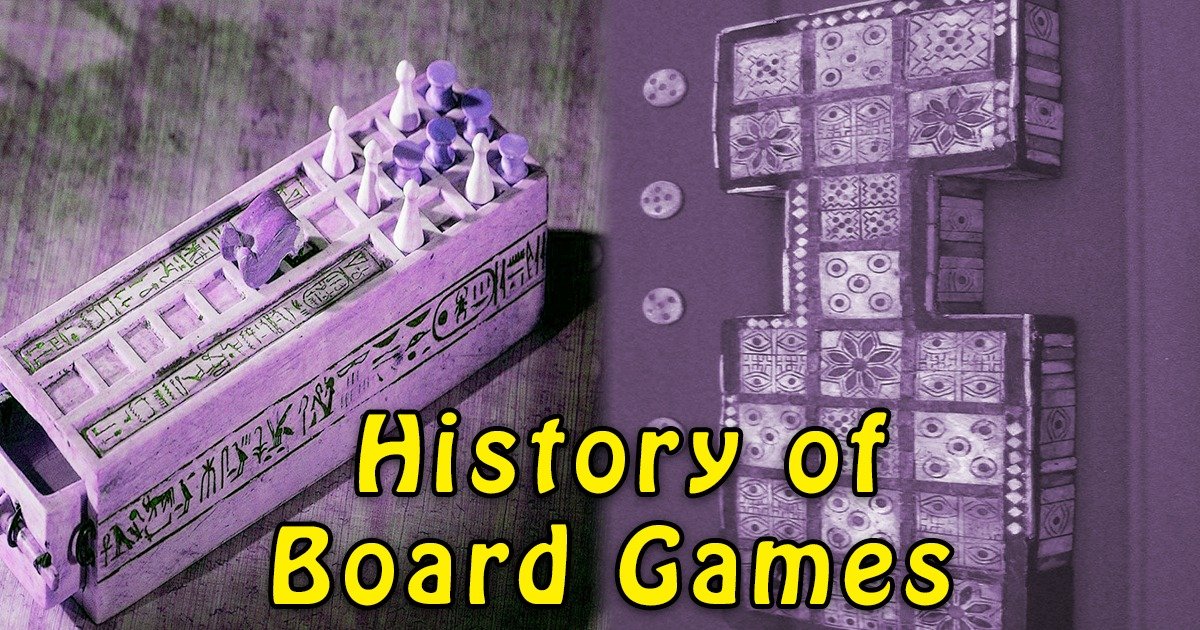Board games have captivated players for thousands of years, providing not only entertainment but also a reflection of human culture. From ancient artifacts to modern classics, board games have evolved in complexity and significance, mirroring societal changes and technological advancements. This blog post delves into the history and cultural significance of board games, uncovering how they have influenced and been influenced by human history.
The Origins of Board Games: Ancient Beginnings
The history of board games stretches back to ancient civilizations, where they were more than just pastimes—they were integral to cultural and spiritual practices. One of the earliest known board games is Senet, dating back to ancient Egypt around 3100 BCE. Senet, often found in tombs, was believed to be a game of strategy and luck, reflecting the Egyptians’ beliefs about the afterlife and fate.
Similarly, the game of Go, originating in ancient China around 2000 BCE, is one of the oldest board games still played today. Go involves placing stones on a grid to capture territory, showcasing early strategic thinking and intellectual engagement. These ancient games set the stage for the development of board games as a significant cultural artifact.
Board Games Through the Ages: From Antiquity to the Middle Ages
As civilizations progressed, so did board games. During the Roman Empire, games like Latrunculi and Tabula became popular, with rules and strategies reflecting the complex military and social structures of the time. These games often served as training tools for soldiers and as a form of intellectual exercise for the elite.
The Middle Ages saw the emergence of chess, which is often considered one of the most influential board games in history. Chess originated in India around the 6th century CE and spread to Persia and Europe, evolving into the game we know today. Chess became a symbol of strategic warfare and intellectual prowess, influencing both gameplay and societal values.
The Renaissance and Board Games: Innovation and Popularization
The Renaissance period marked a significant shift in the design and popularity of board games. With advancements in printing technology, games became more accessible to the general public. The creation of printed boards and cards allowed for the widespread distribution of games, contributing to their growing popularity.
During this time, games like The Game of the Goose emerged, which was an early form of a race game, and eventually led to the creation of modern board games such as Monopoly. The Renaissance also saw the introduction of new game mechanics and themes, reflecting the period’s fascination with exploration, discovery, and social interaction.
Modern Board Games: The Rise of Contemporary Favorites
The 19th and 20th centuries saw a boom in the development of board games, driven by industrialization and cultural shifts. Classic games such as Monopoly, Scrabble, and Risk became household names, each contributing to the evolution of board games with new rules and formats.
Monopoly, originally created in the early 20th century, became a symbol of capitalism and economic strategy, while Scrabble, developed in the 1930s, highlighted the growing interest in wordplay and education. The rise of these modern board games reflects broader societal trends and technological advancements, making them enduring favorites.
Cultural Significance: How Board Games Reflect Societal Values
Board games are more than just entertainment—they are cultural artifacts that reflect societal values and norms. For example, Monopoly’s focus on real estate and economic strategy mirrors capitalist values, while games like The Game of Life illustrate the various life stages and societal expectations.
In different cultures, board games often incorporate local traditions and values. For instance, the Japanese game of Shogi is similar to chess but with unique rules and pieces, reflecting Japanese strategic thinking and cultural heritage. Board games serve as a mirror of societal structures and beliefs, showcasing how people view themselves and their world.
Educational Value of Board Games: Learning Through Play
Board games are recognized for their educational benefits, offering a fun and interactive way to learn. Games like Settlers of Catan teach resource management and strategic planning, while trivia games enhance general knowledge and memory.
Educational institutions often use board games as teaching tools, leveraging their engaging nature to facilitate learning in subjects such as history, math, and language arts. By incorporating board games into curricula, educators can create dynamic learning environments that encourage critical thinking and problem-solving.
Board Games and Social Interaction: Building Connections Through Play
One of the most significant aspects of board games is their ability to foster social interaction. Board games bring people together, encouraging communication, collaboration, and friendly competition. Whether it’s a family game night or a gathering with friends, board games create opportunities for bonding and shared experiences.
The social nature of board games has led to the growth of gaming communities and clubs, where enthusiasts gather to play and discuss their favorite games. These communities often extend beyond local boundaries, connecting people from different regions and cultures through their shared passion for gaming.
The Global Influence of Board Games: A Worldwide Perspective
Board games have a global presence, influencing and being influenced by cultures around the world. In Europe, games like Carcassonne and Ticket to Ride have gained popularity, while in the United States, games such as Risk and Codenames have become staples.
International board game conventions and festivals celebrate this global diversity, showcasing games from various countries and highlighting the unique cultural elements they incorporate. This cross-cultural exchange enriches the board gaming experience, allowing players to explore different perspectives and traditions.
The Future of Board Games: Trends and Innovations
As technology advances, the future of board games looks promising, with trends such as digital integrations and cooperative gameplay gaining traction. Hybrid games that combine traditional board game elements with digital components offer new possibilities for interactive experiences.
Additionally, the rise of crowdfunding platforms has democratized game development, allowing independent designers to bring innovative concepts to life. This trend is likely to continue, leading to a diverse and ever-evolving landscape of board games.
The Impact of Board Games on Cognitive Development
Board games are more than just a source of entertainment; they play a significant role in cognitive development. Research has shown that playing board games can enhance various cognitive skills, including problem-solving, strategic thinking, and memory.
Enhancing Problem-Solving Skills
Board games often require players to navigate complex situations and make strategic decisions. For example, games like Settlers of Catan involve resource management and negotiation, requiring players to think critically about their moves and their impact on the game. This type of gameplay encourages players to develop and refine their problem-solving skills, as they must evaluate different strategies and adapt their approach based on the actions of their opponents.
Improving Strategic Thinking
Strategic thinking is another crucial cognitive skill that board games can help develop. Games such as Chess and Risk require players to plan their moves carefully and anticipate their opponents’ actions. This strategic planning not only improves cognitive abilities related to foresight and planning but also fosters patience and perseverance. Players learn to consider long-term consequences and make decisions that will benefit them in the future, skills that are transferable to real-life scenarios.
Boosting Memory and Concentration
Board games also have a positive impact on memory and concentration. Games that involve remembering rules, tracking resources, or recalling past moves challenge players to engage their memory and focus. For instance, Memory and Simon are classic games designed specifically to enhance memory skills. Playing these games regularly can improve both short-term and long-term memory, as well as concentration levels.
Board Games as a Tool for Cultural Exchange
Board games serve as a medium for cultural exchange, allowing players from different backgrounds to share and experience diverse traditions and perspectives. This aspect of board gaming has become increasingly prominent as international games gain popularity and new games are developed with global themes.
Promoting Cross-Cultural Understanding
Playing board games from different cultures can foster cross-cultural understanding and appreciation. For example, games like Go from China and Carcassonne from France offer insights into the cultural contexts from which they originated. By engaging with these games, players can learn about the values, traditions, and historical contexts of other cultures, which can promote empathy and global awareness.
Encouraging Global Collaboration
Board games also encourage global collaboration through international tournaments and gaming communities. Events like the International Gamers Award and the Essen Spiel convention bring together players, designers, and enthusiasts from around the world. These gatherings provide opportunities for cultural exchange and collaboration, as participants share their love for games and learn from one another’s experiences.
Fostering Inclusive Gaming Communities
The rise of online gaming platforms and social media has made it easier for board game enthusiasts to connect and collaborate globally. Online forums, discussion groups, and digital platforms allow players from different countries to share strategies, discuss games, and form friendships. This inclusivity helps bridge cultural gaps and fosters a sense of community among gamers worldwide.
Conclusion: The Timeless Appeal of Board Games
Board games have endured through centuries, evolving from ancient artifacts to modern classics. Their historical significance and cultural impact highlight the role of games in reflecting and shaping human society. As board games continue to innovate and adapt, their timeless appeal remains a testament to their enduring value in entertainment, education, and social interaction.

Evelyn White is an experienced content writer with a background in lifestyle, trends, and practical advice. With several years of writing across digital platforms, she specializes in making everyday topics accessible, informative, and engaging. Her goal is to deliver trustworthy, reader-focused content that’s both useful and easy to understand.

